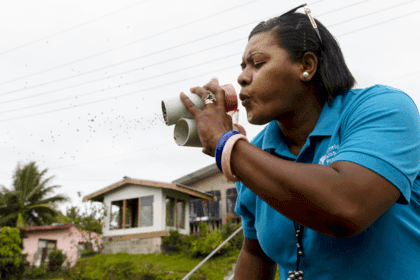
From risk to remedy – how mosquitoes could save lives
Hear from Professor Scott O’Neill, founder of the World Mosquito Program, who is using mosquitoes infected with a naturally occurring bacterium to revolutionise disease prevention.
More than 3.9 billion people live alongside mosquitoes that spread viruses like dengue and Zika. Since 2014, Wellcome has supported the World Mosquito Program to use natural Wolbachia bacteria to reduce the ability of these mosquitoes to transmit viruses. This ground-breaking initiative has already protected 13.3 million people across 16 countries – transforming global health through innovative science.

Adrienne Surprenant / Agence MYOP, Wellcome
Marcos has been working with the World Mosquito Program in Niteroi for a year, releasing mosquitoes that carry Wolbachia bacteria. It’s the first day of a second round of releases. His car contains 900 tubes, which are released every 50 metres.
Mosquitoes carrying Wolbachia are less able to transmit dengue, and, over time, the Wolbachia mosquitoes breed with the wild mosquito population, leading to a decrease in the spread of infection.
The Aedes aegypti mosquito is the primary vector of the dengue, chikungunya, yellow fever and Zika viruses. This single mosquito species is responsible for almost all the world’s dengue transmission, infecting an estimated 390 million people every year.
The Aedes mosquitoes can now be found on every continent except Antarctica. However, the burden of these diseases is highest in the world’s poorest populations.
The problem is that Aedes mosquitoes are very hard to control.
They have adapted to human environments and are becoming resistant to many pesticides. They are also most active during the day, so other common interventions like bed nets aren’t as effective.
The challenge of controlling these mosquito populations and curbing disease transmission needs innovative solutions.
The World Mosquito Program began as the Eliminate Dengue Program in 2008, initiated by groundbreaking research into the Wolbachia bacteria at Monash University in Australia.
The program developed an innovative technique that introduces natural Wolbachia bacteria into mosquito populations to inhibit the mosquitoes' ability to transmit viruses to humans.
Recognising the transformative potential of this approach, in 2016, Wellcome joined a coalition including the US Agency for International Development, the UK Government, and the Bill and Melinda Gates Foundation to provide crucial support for the initiative.
This essential funding enabled the World Mosquito Program to transition from localised projects to an international operation and boosted the research, infrastructure, and collaboration essential for the programme's success.

Hear from Professor Scott O’Neill, founder of the World Mosquito Program, who is using mosquitoes infected with a naturally occurring bacterium to revolutionise disease prevention.
As of 2024, the World Mosquito Program has released Wolbachia-infected mosquitoes in 16 countries across Asia, Africa, Latin America and the Western Pacific.
Results from global project sites consistently show that dengue is reduced in communities where Wolbachia has been deployed. For example, in Yogyakarta, dengue incidence fell by 77% in Wolbachia-treated areas compared with untreated areas.
The program prioritises community engagement everywhere it works – collaborating with independent community groups to ensure broad acceptance of the technique before releasing any mosquitoes. Across the globe, consistently high levels of community acceptance highlight the recognition and trust in the World Mosquito Program’s efforts.
This collaborative approach not only enhances public health outcomes but also empowers communities to protect themselves sustainably.
In total, around 13.3 million people have already been protected from mosquito-borne diseases, preventing an estimated one million dengue cases and 70,000 hospitalisations. And modelling predicts that Wolbachia’s virus-blocking properties will eliminate dengue transmission in these mosquito populations for decades to come.
Source: World Mosquito Program
An interactive world map shows where the World Mosquito Program has deployed Wolbachia mosquitoes and the number of people reached in each country.
Note: Data is not yet available for Senegal or Timor Leste. Due to a display error, Kiribati is currently not displaying in map view.
Sorted alphabetically by country
Source: World Mosquito Program
An interactive world map shows where the World Mosquito Program has deployed Wolbachia mosquitoes and the number of people reached in each country.
Note: Data is not yet available for Senegal or Timor Leste. Due to a display error, Kiribati is currently not displaying in map view.
Infectious diseases are among the biggest health challenges in the world today.
We support the research and development of innovative solutions, like the Wolbachia method, to combat infectious diseases in the regions with the greatest burden.
As the World Mosquito Program expands its reach into new regions, support from Wellcome and other global partners will be critical to ensure this pioneering work continues.


